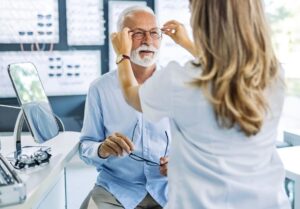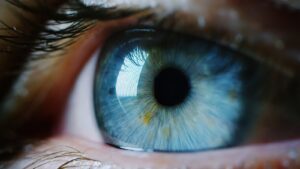Relief From Dry Eyes
Solutions for Dry Eyes
Do your eyes often feel dry, itchy, or irritated? You’re not alone. Dry eye syndrome is a common issue affecting millions worldwide and can affect daily life. But the good news is, there are things we can do to help give you relief from dry eyes. Understanding the causes of dry eyes and the treatment options can help a lot.
What Causes Dry Eyes?
Dry eye syndrome happens when your eyes don’t make enough tears or when the tears they do make aren’t good quality. There are a few things that can lead to dry eyes:
- Age: As we get older, our eyes tend to have fewer tears, which can make us more likely to have dry eyes.
- Environmental factors: These include living in a dry climate, being in the wind, or being around indoor heating or air conditioning a lot. They can make your tears evaporate faster and worsen dry eyes.
- Screen Time: Spending a lot of time staring at screens, like phones, computers, or TVs, can make you blink less often, leading to dry eyes.
- Medical Conditions: Some health problems, like diabetes, thyroid issues, or autoimmune diseases, can make dry eyes more likely.
- Medications: Certain medicines, like allergy pills, cold medicines, or antidepressants, can reduce tear production and worsen dry eye symptoms.
Treatment Options for Dry Eyes
Caring for dry eyes usually means changing your lifestyle or using medical treatments to help with your symptoms and make more tears. Here are some things that can help:
- Artificial Tears: These are eye drops you can buy at the store that can relieve your eyes by adding moisture and helping your tears do their job.
- Lifestyle Changes: Simple things like taking breaks from screens, drinking enough water, or using a humidifier can make a big difference in how your eyes feel.
- Prescription Medications: Sometimes, your eye doctor might give you special eye drops with medicine to help with inflammation and make more tears.
- Nutritional Supplements: Fish oil supplements with omega-3 fatty acids can improve the quality of your tears and dry eye symptoms.
- In-Office Treatments: You can only get some treatments in the doctor’s office that can help with dry eyes if other things aren’t working. These include punctal plugs, meibomian gland expression, and intense pulsed light (IPL) therapy.
In-Office Dry Eye Treatment at Levin Eye Care Center
At Levin Eye Care Center, we offer different treatments for dry eyes that you can only get in the office. Our award-winning staff will check your eyes and determine what’s causing dry eye symptoms. Then, we’ll make a treatment plan that’s right for you.
- Punctal Plugs: These tiny plugs go in your tear ducts to keep your tears from draining away too quickly and help your eyes stay moist.
- Meibomian Gland Expression: This process squeezes the oil glands in your eyelids. This helps them make more oil, which can keep your tears from evaporating too fast.
Dry eyes can be annoying and uncomfortable, but there are things we can do to help you feel better. At Levin Eye Care Center, we’re here to give you the care and support you need to get relief from your dry eye symptoms.
Contact us today to set up a visit and start your journey to clearer, more comfortable vision and feel relief from dry eyes.






